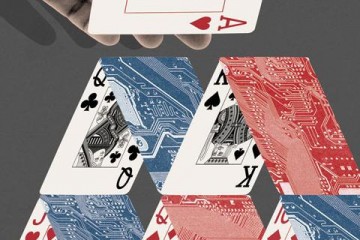For as long as he has been playing poker, Avi Rubin has dreamed of mixing it up with the pros.
Tonight, he'll get his chance in one of two invitation-only cash games being filmed at Maryland Live Casino at Arundel Mills for the forthcoming TV series "Poker Night in America." The games will feature a mix of amateur players (including Rubin) and well-known players, including 2012 World Series of Poker Main Event champion Greg Merson, who grew up minutes from the casino; and amateur Darvin Moon, a Western Maryland logger who made an improbable run to the final table at the World Series of Poker in 2009.
"I feel like a kid who dreams of playing in the NBA, and suddenly gets a chance to play ball with the big boys," Rubin says. "But in poker, since there is also an element of luck, I actually have a chance of winning, or at least surviving."
Rubin—a professor of computer science in Johns Hopkins' Whiting School of Engineering, technical director of the Johns Hopkins University Information Security Institute, and director of the university's Health and Medical Security Lab—started playing poker about seven years. He was instantly drawn to the math, the probability, the game theory.
A feature story in the summer 2012 issue of Johns Hopkins Magazine described how Rubin caught the poker bug:
About five years ago, Rubin's father mentioned that Avi's younger brother, Yaacov, had been winning money playing poker online. Soon after, Avi suggested to Yaacov that they play sometime. "He kind of laughed at me and started asking a few questions about hands and situations," Rubin recalls. "He said, 'You know so little about poker, you don't realize that you don't know anything about poker.'" Rubin thought his little brother was just being arrogant, but when Yaacov recommended a poker book called Harrington on Cash Games: Volume I, Rubin read it at a few sittings, highlighting the text, making notes, utterly engrossed. "It was probably the most fascinating experience I've ever had, to read that book and understand the science and the math behind poker and to realize that a game I'd considered fun my whole life actually had more depth than I'd ever considered," he says. After his family and his work, poker became Rubin's main interest, displacing pocket billiards, his previous obsession. He is a man of strong enthusiasms, serially all in, you might say, and now he bought every poker book he could find and studied them for hours, rereading the best ones. He started seeking out games with better players, learning by losing until he began to win. And he set a goal—to play his way into the World Series of Poker in Las Vegas, the biggest poker tournament in the world, by the time he was 50.
Rubin plays once or twice a week, he says, with "a few extra games" thrown in each month.
"I am obsessively passionate about poker," Rubin says. "The geek in me loves the math and science of it. The competitor in me loves the action, and it's also fun hanging out with friends every week."
Some of those same friends emailed him a link to a Washington Post article earlier this month about the "Poker Night in America" taping. Rubin sent in an application (which included a copy of the aforementioned Johns Hopkins Magazine article), and he found out last week that he was in the game.
The television air date for tonight's games is still TBD—the series is tentatively scheduled to debut on April 27 on "a national cable network (to be announced soon)." But Rubin's enthusiasm is unmistakeable.
"I have to say, I'm pretty excited about this," Rubin says. "It's been a dream of mine to play with some of these guys whom I've seen on TV many times."








